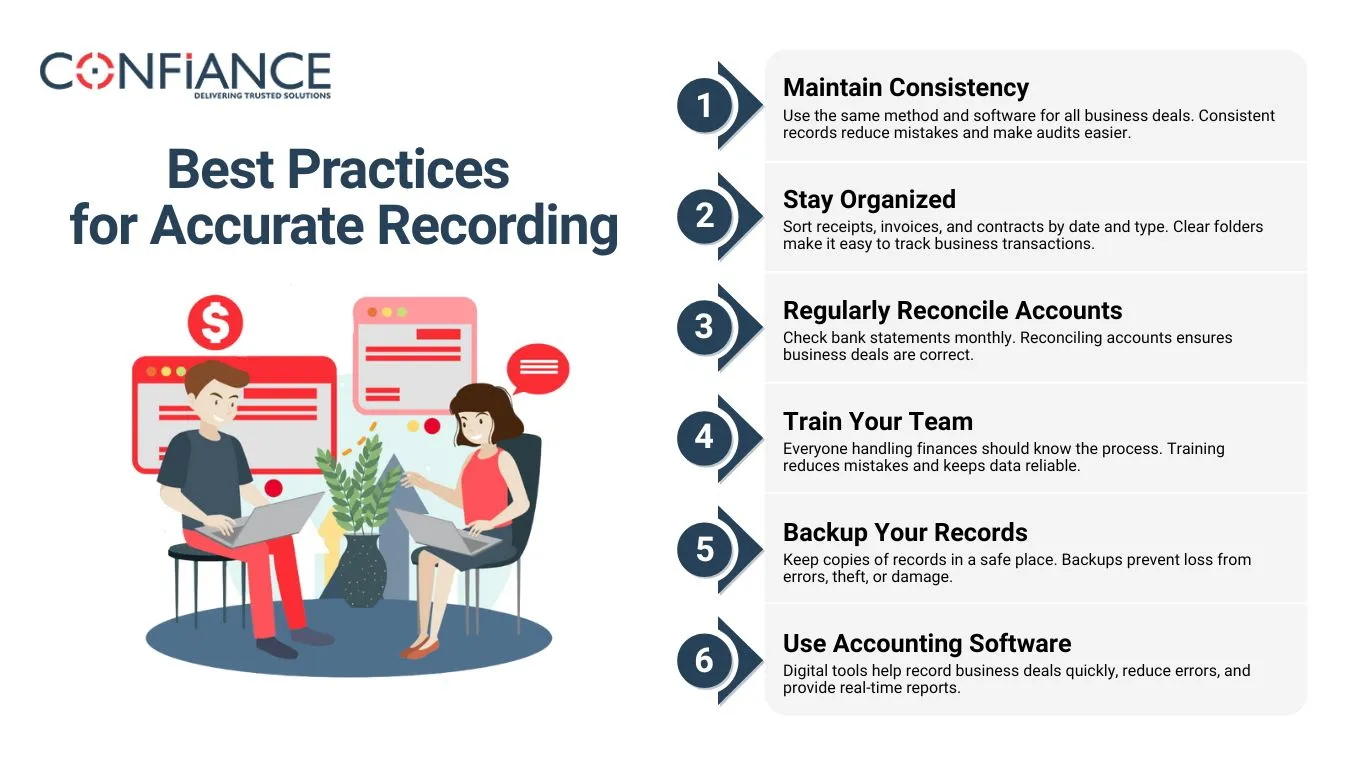
Best Practices on How to Record Your Business Transactions
Running a business means keeping track of the money that comes in and goes out. Business transactions are the core of this process. Knowing how to record business transactions the right way helps you stay clear, avoid mistakes, and make smart choices.
Recording transactions is not just about numbers. It shows the real state of your business, helps plan for growth, and keeps you ready for taxes and checks. Every cash sale, payment, or purchase matters. Using simple steps, clear tools, and the same method each time keeps your records neat and correct. This guide will show easy ways to track, record, and check your business transactions so you can make better choices and grow your business safely.
Understanding Business Transactions
Before learning how to record business transactions, you must know what they are. A business transaction is any action that changes your company’s money or value. This includes sales, purchases, payments, and receipts.
Types of Business Transactions
There are three main types:
- Cash Transactions: Money moves right away. For example, paying a supplier or getting cash from a client.
- Credit Transactions: Payment happens later, such as buying supplies on credit.
- Non-Cash Transactions: These affect accounts but not cash, like asset depreciation or barter deals.
Why Recording Business Transactions Matters
Recording your business transactions is not only required by law. It also helps your business in many ways:
Track Your Money
Keep all money coming in and going out in order. This shows what you earn, what you spend, and how much cash you have. It helps plan for bills and needs.
Make Smart Choices
When you know your cash flow, you can choose when to spend, save, or grow your money. Good records help you avoid waste and make small or large choices safely.
Follow the Rules
Write down all your buys, sales, and payments. This keeps your records neat and makes it easy to give proof when the law or tax office asks.
Avoid Mistakes
Clear records help stop errors. You can check money in and out and avoid fights with staff, clients, or suppliers. It keeps your work smooth and safe.
Plan to Grow
If you watch your cash and costs, you can see where to grow. You can add tools, hire help, or change how you sell to earn more.
Save Time
When records are clear, you spend less time searching for papers. You can check totals fast and make work easy, so you have more time for your tasks.
Steps on How to Record Business Deals
Recording money moves can seem hard at first. By following clear steps, you can keep your records neat, avoid mistakes, and track all money in and out.
Step 1: Find the Action
Look at each move that changes money or items you own. Write down if cash came in, went out, or something of value was added or used. This helps track all changes clearly.
Step 2: Keep Proof
Save slips, bills, and notes for every action. Proof helps you check work later, show records to others if needed, and makes your books clear and strong.
Step 3: Group the Action
- Earned money: Cash in from sales or work
- Spent money: Cash out for costs or bills
- Things owned: Tools, stock, or other items
- Money owed: Loans, bills not yet paid
Grouping actions this way keeps your records neat and easy to read.
Step 4: Record in the Books
Use a book or simple software. Record the date, money in or out, accounts used, and the amount. Every move should be easy to trace later.
Step 5: Check and Fix
Look at your records often. Match entries with bank slips and saved proofs. Fix any mistakes right away. This keeps your records correct and your work smooth.
Tools for Recording Business Deals
Manual recording can take time. Some helpful tools include:
Accounting Software
QuickBooks, Xero, or Zoho Books can:
- Automate entries
- Make reports
- Reduce mistakes
- Track cash flow
Spreadsheets
Small businesses can use Excel or Google Sheets. These track cash, credit, and inventory simply.
Common Mistakes to Avoid
Avoid these pitfalls when recording business transactions:
Mixing Money
Do not mix your own cash with business cash. Keep them apart. Mixing money makes books wrong and can hide real profits or costs.
Not Keeping Slips
Save all slips and bills for every move. Lost proof makes it hard to check work or show money flow to others.
Ignoring Small Moves
Track all small cash flows, even coins. Tiny costs add up. Missing them can make totals wrong and hide the real gain or loss.
Waiting to Write
Write each cash move right away. Waiting can cause forgotten moves, errors, and extra work to fix books later.
Wrong Place for Money
Put cash in the right box or page. Wrong placement makes books wrong and reports hard to read or check.
Skipping Checks
Look at your books each week. Skipping checks lets small errors grow and makes fixing them harder later.
Not Updating Tools
Keep your book or app fresh. Old tools may fail to track moves, which can make your money record wrong.
Best Practices for Accurate Recording
Maintain Consistency
Use the same method and software for all business deals. Consistent records reduce mistakes and make audits easier.
Stay Organized
Sort receipts, invoices, and contracts by date and type. Clear folders make it easy to track business transactions.
Regularly Reconcile Accounts
Check bank statements monthly. Reconciling accounts ensures business deals are correct.

Train Your Team
Everyone handling finances should know the process. Training reduces mistakes and keeps data reliable.
Backup Your Records
Keep copies of records in a safe place. Backups prevent loss from errors, theft, or damage.
Use Accounting Software
Digital tools help record business deals quickly, reduce errors, and provide real-time reports.
Benefits of Following Best Practices
Accurate Financial Reports
Well-kept business moves show clear profit, loss, and cash flow. Simple, neat records make it easy to see growth, check totals, and plan for bills or new tools.
Better Decision Making
Keeping all cash and items recorded helps make smart choices. You can plan spending, save money, and decide where to invest without guessing or making mistakes.
Time-Saving
Following clear steps reduces errors and confusion. Correct records save hours of work and stress, letting you focus on running your business instead of fixing mistakes.
Business Growth
Neat records help attract investors, secure loans, and show you run the business well. Clear books make your company more trusted and open to new opportunities.
Reduce Errors
Writing down every move and keeping proof stops mistakes. Organized records give trustworthy numbers, and audits or checks are much faster and easier.
Simplify Tax Filing
Clear records make tax time fast and easy. When all moves are tracked, filing becomes simple, mistakes drop, and reports stay correct for taxes or audits.
Better Cash Control
Keeping all cash moves recorded helps you know how much money is on hand. You can plan payments, avoid shortages, and make sure bills and costs are always covered without stress.
Clear Business Insights
Neat records let you see patterns in income and cost. You can find what brings profit, where money is lost, and make small changes to run your business more wisely.
Easy Team Coordination
When books are clear, your team can understand the money flow quickly. Everyone knows what is paid, owed, or earned. This reduces mistakes and keeps work smooth and organized.
Recording business transactions correctly is key to keeping your books clear and your business on track. Simple steps, proof, and regular checks help avoid mistakes and save time. Using tools and expert help makes the process easier and more reliable, letting you focus on growth and smart decisions.
At Confiance, we provide full services for small and medium businesses. Our certified experts record, check, and report all transactions. We track cash, costs, and items with care and accuracy. For clear records and easy financial data for planning and audits, partner with us for a trusted solution.
FAQs
1. What is a business transaction?
A business transaction is any move that changes cash, items, or debts of a company. This includes sales, buys, payments, or money received.
2. Why is it important to know how to record business transactions?
Knowing how to record business transactions helps avoid mistakes, track cash, plan spending, and keep reports ready for taxes, audits, or growth decisions.
3. Why should I keep proof for every move?
Proof like slips, bills, or notes shows each move is real. It helps check work, stop mistakes, and gives support for audits or taxes.
4. How often should I check my records?
Look at your books at least once a week. This helps spot errors fast and keeps totals correct.
5. What are common mistakes to avoid?
Do not mix personal cash with business cash, ignore small moves, lose slips, wait to write, or put money in the wrong place.
6. Should I use software to record moves?
Yes. Simple software or apps help track money fast, reduce errors, and save time, even if the business is small.
7. Can accurate records help my business grow?
Yes. Good records show profit and cost, help plan spending or save, attract investors, and make loans easier to get.
